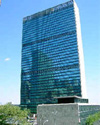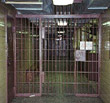| The Iraqi government said Tuesday it would review the status of foreign security firms after a fatal shooting of civilians involving Blackwater USA, while radical Shiite cleric Muqtada al-Sadr called for a ban on all the companies of "the occupiers." A series of bombings, meanwhile, ripped through Baghdad, killing at least 18 people and wounding more than 60, police said. The deadliest attack was a car bombing in a parking lot near the Health Ministry and the city's main morgue that claimed seven lives. The Interior Ministry said Monday that Blackwater — a Moyock, N.C.-based company that protects U.S. diplomats and other dignitaries and projects in Iraq — was banned from working in the country after Sunday's deadly shootings that apparently occurred after a car bombing in western Baghdad. The shootings have touched a nerve and raised scrutiny over what many Iraqis consider a mercenary force that runs roughshod over people in their own country. Blackwater is one of three private security firms employed by the State Department to protect its personnel in Iraq, and a decision to force it to pull out would create tremendous difficulties for the U.S. government. The two other firms, both of which are headquartered in the Washington, D.C., suburbs, are Dyncorp, based in Falls Church, Va., and Triple Canopy, based in Herndon, Va. Government spokesman Ali al-Dabbagh said he understood the need for protection for Westerners and dignitaries but that preliminary findings showed Blackwater used excessive force. Citing Interior and Defense ministry initial findings, al-Dabbagh told CNN that more than 20 people were killed. Interior Ministry spokesman Maj. Gen. Abdul-Karim Khalaf, however, said 11 were killed. The discrepancy could not be reconciled. Blackwater has insisted its employees acted in self-defense and that those killed were armed combatants who threatened State Department personnel. Both Iraqi officials appeared to soften the government's position after Secretary of State Condoleezza Rice assured Prime Minister Nouri al-Maliki of a fair and transparent investigation. "We have to protect the people. At the same time we have to show the sovereignty of the government in Iraq," al-Dabbagh told CNN. But he stressed the ban on Blackwater was temporary pending the final investigation: "We are not intending to stop them and revoke their license indefinitely, but we do need them to respect the law and the regulation here in Iraq." Khalaf said the important thing was "to know the truth and to protect the rights of the victims and to reach the best means in order to prevent such incidents in the future." Blackwater and other foreign contractors accused of killing Iraqi citizens have gone without facing charges or prosecution in the past, and it was unclear why the shooting Sunday drew such a fierce reaction by the Iraqi government. Al-Maliki, under political pressure, may have seen a straightforward way to gain political ground by lashing out at a practice unpopular with all Iraqis. Unlike many deaths blamed on foreign contractors, Sunday's shootings took place in a crowded area in downtown Baghdad with dozens of witnesses. The Interior Ministry also has recently clamped down on weapons permits for the foreign security companies with a series of conflicting measures that have created some confusion among Iraqi security forces as well as the contractors. The circumstances surrounding Sunday's attack were uncertain. Blackwater said its employees came under fire. "Blackwater regrets any loss of life but this convoy was violently attacked by armed insurgents, not civilians, and our people did their job to defend human life," Blackwater's spokeswoman, Anne E. Tyrrell, said in a statement. U.S. officials said the motorcade was traveling through Nisoor Square on the way back to the Green Zone when the car bomb exploded, followed by volleys of small-arms fire that disabled one of the vehicles. Al-Dabbagh said the preliminary report by the Interior and Defense ministries showed helicopters fired on the crowd; Blackwater has denied any aircraft were used. Al-Sadr called for all contracts of foreign securities firms to be annulled and blamed the government for failing to protect Iraqis, noting the shootings occurred on a busy square filled with Iraqi troops. "This aggression wouldn't have happened had it not been for the presence of the occupiers who brought these companies," al-Sadr's political committee said in a statement issued by his office in the holy city of Najaf. It also called for a speedy investigation, the referral of those involved to the Iraqi justice system and compensation for families of the victims. Amid allegations that the foreign security contractors operate with impunity, al-Maliki's Cabinet held a meeting Tuesday and confirmed that "it is necessary to review the status of local and foreign private security companies working in Iraq according to what is suitable with Iraqi laws." Order No. 17, a law issued by the Coalition Provisional Authority in Iraq before the Iraqis regained sovereignty in June 2004, gave the companies immunity from Iraqi prosecution. Al-Dabbagh insisted the government was now sovereign and had the right to act against the contractors, "but we don't want to do so because we don't have the services which they are providing for the diplomats and for the American Embassy here in Iraq." Hassan al-Rubaie, a member of the parliament's Security and Defense Committee, said an investigative committee has been formed and members would consider abolishing the immunity law. "There are reports that they were subjected to fire but this does not give them the right to kill innocent civilians," he said. |







